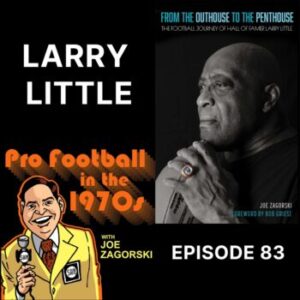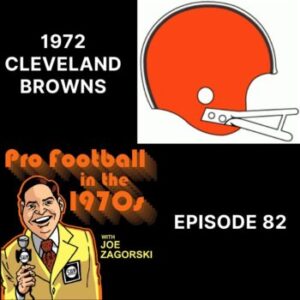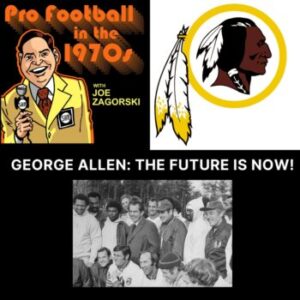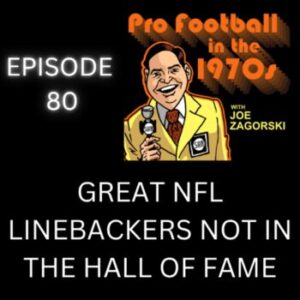When George Allen became the new head coach for the Washington Redskins in 1971, the rebirth of the team occurred. They had for many years been a mediocre team at best. But when Allen got there, he changed the culture of that team in a very abrupt fashion. Almost overnight, the ho-hum Redskins became the vibrantly emotional Redskins.
Allen knew that the sport of football was a sport primarily of emotion, so he stressed that to his players. A trademark of Allen’s teams was the sight of them jumping up and down, yelling out their support to their teammates, etc. It was pure emotion.
George Allen
Allen was the type of coach who practiced what he preached. Films from that era consistently show Allen doing plenty of yelling and encouraging his players up and down the bench area of the team. Indeed, George Allen was a sight to see along the Washington sidelines during the 1970s.
The results of all this emotion? Just look at the Redskins’ won-loss record during the seven years that Allen was at the helm of the team. Washington won 67 games compared to just 30 losses and one tie from 1971 to 1977. Having Allen as their head coach, the Redskins experienced a rebirth of success in the NFL.
One tenet of George Allen’s coaching philosophy involved “who” he would be coaching. Allen believed that it was much more beneficial for his roster to possess older and more experienced players. So right from the start prior to his very first game at the helm in Washington, Allen went about obtaining quite a few of those older players by trading away most of his draft choices.
In effect, Allen was trading away the promise of his team’s future for the potential of his team’s present. The term he used for these moves was “The Future is Now.”
Allen’s decision to obtain new “older” players produced immediate dividends, and it made him look like a genius. Washington had a 6-8 record in 1970 under head coach Bill Austin. In 1971 under Coach Allen, the Redskins earned a 9-4-1 record and a berth in the NFL playoffs. They may have lost their first playoff game to the San Francisco 49ers on December 26, 1971, but Washington was just getting warmed up.
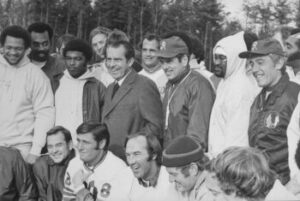
A list of those new “old” players on that Allen’s first Redskins team in 1971 included a bunch of players from his former team, the Los Angeles Rams, as well as notable performers from other teams. The new Washington veterans included the likes of Diron Talbert, Myron Pottios, Billy Kilmer, Roy Jefferson, Boyd Dowler, Ron McDole, Clifton McNeil, Verlon Biggs, Jack Pardee, Richie Petitbon, John Wilber, and Speedy Duncan.
That’s quite a lot of players to obtain via the trade routes, and when you consider that George Allen obtained them all in the span of just a few months prior to the start of the 1971 season, well, it had to have been one of the most remarkable examples of NFL front office wheeling and dealing that had ever been seen.
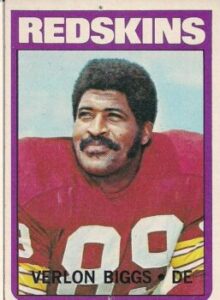
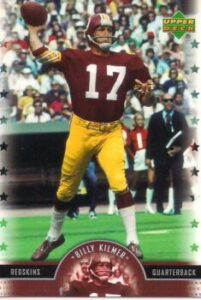
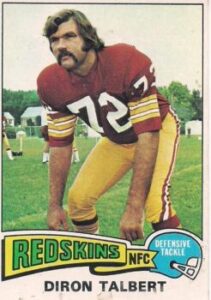
Allen’s team would reach their epoch of success in 1972, when they won the NFC Championship and played in Super Bowl VII, which they lost to the undefeated Miami Dolphins, 14-7. But that defeat did not deter Allen nor his team. Washington made it back to the playoffs in 1973 and 1974.
They failed to reach the postseason tournament in 1975, but in 1976, with a whole new batch of traded-for veteran players, Allen’s Redskins team returned to the playoffs. Washington’s 35-20 loss at Minnesota in the 1976 NFC Divisional Playoffs was unfortunately the final postseason defeat for Allen and his Redskins.
His veteran players simply got too old and too slow to effectively compete in the talent-laden NFC East Division by 1977. Following a 9-5 mark in 1977, Allen was relieved as Washington’s head coach.
Allen's Future Is Now Impact
Despite not being able to win a world championship with the Redskins, George Allen’s “The Future is Now” philosophy nevertheless owns a special place in pro football history. It was a theory and a plan that Allen had the guts to implement, and it did produce winning records in the District of Columbia from 1971 to 1977.
Trivia Question:
True or False? George Allen’s Washington Redskins did not lose a single home game in 1972, the year that they won the NFC Championship.
As always, thanks for checking out the many great sports podcasts from many great sports podcasters on the Sports History Network!
Please Share If You Liked This Article
Host of Pro Football in the 1970s - Joe Zagorski
Throughout his days, Joe spent some time as a sportswriter and has been a member of the Pro Football Researchers Association since the mid-1980s. Joe is also a proud member of the Pro Football Writers of America.
Joe Zagorski Books on Amazon
From the Outhouse to the Pethouse: The Football Journey of Hall of Famer Larry Little
Free Spirit at Free Safety: The Incredible (but True!) Football Journey of Bill Bradley
The 2,003 Yard Odyssey: The Juice, The Electric Company, and an Epic Run for a Record
America’s Trailblazing Middle Linebacker: The Story of NFL Hall of Famer Willie Lanier
The Year the Packers Came Back: Green Bay’s 1972 Resurgence
The NFL in the 1970s: Pro Football’s Most Important Decade
Please Note – As an Amazon Associate I earn from qualifying purchases
Music from https://www.purple-planet.com/
More Posts From Pro Football In The 1970s
Exploring the Career of Hall of Fame Offensive Guard Larry Little
As many of you may know, I recently wrote a...
Read MoreRemembering the 1972 Cleveland Browns
How many NFL teams during the 1970s do you remember...
Read MoreThe Future Is Now With George Allen
When George Allen became the new head coach for the...
Read MoreGreat NFL Linebackers Who Are Not in the Hall of Fame
There are many great pro linebackers who are enshrined...
Read More
